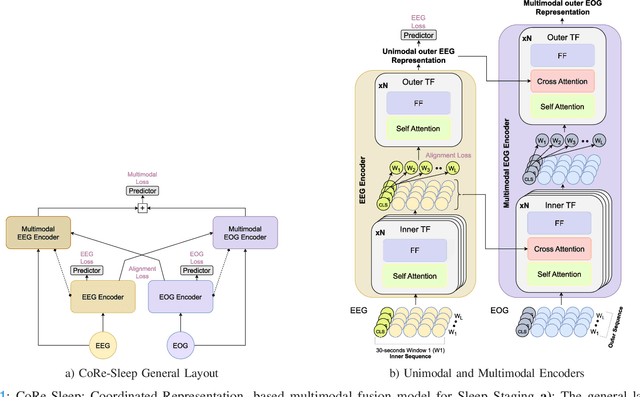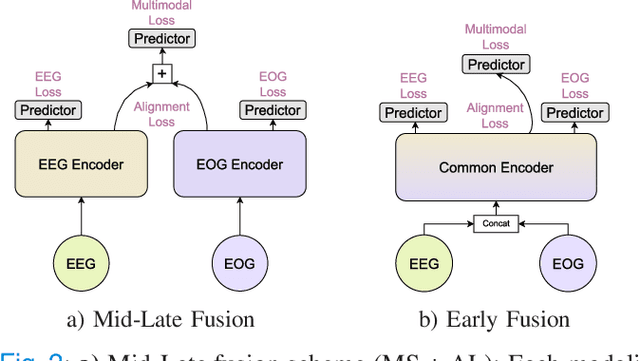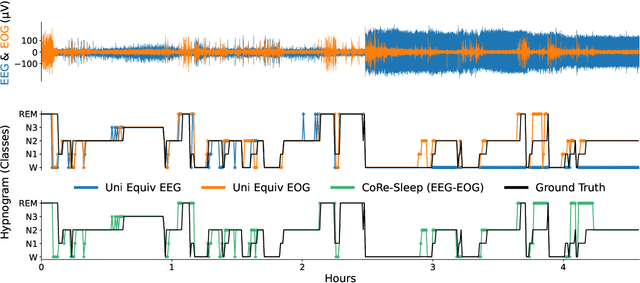Konstantinos Kontras
Multimodal Fusion Balancing Through Game-Theoretic Regularization
Nov 11, 2024



Abstract:Multimodal learning can complete the picture of information extraction by uncovering key dependencies between data sources. However, current systems fail to fully leverage multiple modalities for optimal performance. This has been attributed to modality competition, where modalities strive for training resources, leaving some underoptimized. We show that current balancing methods struggle to train multimodal models that surpass even simple baselines, such as ensembles. This raises the question: how can we ensure that all modalities in multimodal training are sufficiently trained, and that learning from new modalities consistently improves performance? This paper proposes the Multimodal Competition Regularizer (MCR), a new loss component inspired by mutual information (MI) decomposition designed to prevent the adverse effects of competition in multimodal training. Our key contributions are: 1) Introducing game-theoretic principles in multimodal learning, where each modality acts as a player competing to maximize its influence on the final outcome, enabling automatic balancing of the MI terms. 2) Refining lower and upper bounds for each MI term to enhance the extraction of task-relevant unique and shared information across modalities. 3) Suggesting latent space permutations for conditional MI estimation, significantly improving computational efficiency. MCR outperforms all previously suggested training strategies and is the first to consistently improve multimodal learning beyond the ensemble baseline, clearly demonstrating that combining modalities leads to significant performance gains on both synthetic and large real-world datasets.
Improving Multimodal Learning with Multi-Loss Gradient Modulation
May 13, 2024



Abstract:Learning from multiple modalities, such as audio and video, offers opportunities for leveraging complementary information, enhancing robustness, and improving contextual understanding and performance. However, combining such modalities presents challenges, especially when modalities differ in data structure, predictive contribution, and the complexity of their learning processes. It has been observed that one modality can potentially dominate the learning process, hindering the effective utilization of information from other modalities and leading to sub-optimal model performance. To address this issue the vast majority of previous works suggest to assess the unimodal contributions and dynamically adjust the training to equalize them. We improve upon previous work by introducing a multi-loss objective and further refining the balancing process, allowing it to dynamically adjust the learning pace of each modality in both directions, acceleration and deceleration, with the ability to phase out balancing effects upon convergence. We achieve superior results across three audio-video datasets: on CREMA-D, models with ResNet backbone encoders surpass the previous best by 1.9% to 12.4%, and Conformer backbone models deliver improvements ranging from 2.8% to 14.1% across different fusion methods. On AVE, improvements range from 2.7% to 7.7%, while on UCF101, gains reach up to 6.1%.
CoRe-Sleep: A Multimodal Fusion Framework for Time Series Robust to Imperfect Modalities
Mar 27, 2023



Abstract:Sleep abnormalities can have severe health consequences. Automated sleep staging, i.e. labelling the sequence of sleep stages from the patient's physiological recordings, could simplify the diagnostic process. Previous work on automated sleep staging has achieved great results, mainly relying on the EEG signal. However, often multiple sources of information are available beyond EEG. This can be particularly beneficial when the EEG recordings are noisy or even missing completely. In this paper, we propose CoRe-Sleep, a Coordinated Representation multimodal fusion network that is particularly focused on improving the robustness of signal analysis on imperfect data. We demonstrate how appropriately handling multimodal information can be the key to achieving such robustness. CoRe-Sleep tolerates noisy or missing modalities segments, allowing training on incomplete data. Additionally, it shows state-of-the-art performance when testing on both multimodal and unimodal data using a single model on SHHS-1, the largest publicly available study that includes sleep stage labels. The results indicate that training the model on multimodal data does positively influence performance when tested on unimodal data. This work aims at bridging the gap between automated analysis tools and their clinical utility.
 Add to Chrome
Add to Chrome Add to Firefox
Add to Firefox Add to Edge
Add to Edge